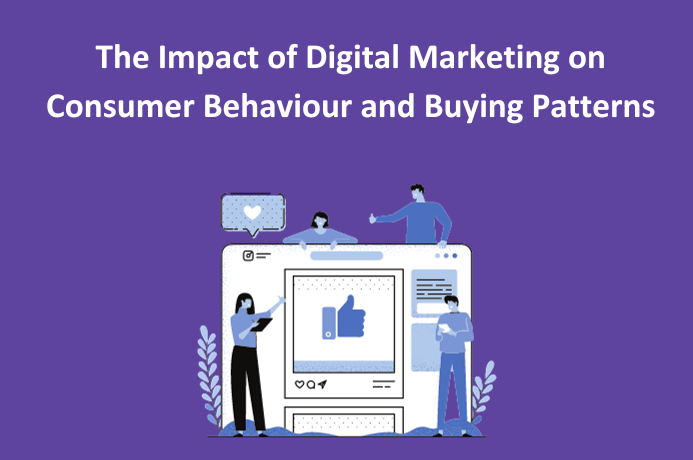Digital Marketing has become a revolutionary force in modern commerce, changing how companies interact with their audience and affecting customer behaviour on a never-before-seen scale. Businesses are utilising the potential of Digital Marketing strategies to improve their online presence and gain a deeper understanding of and influence over customer decision-making processes in this digital age of constant connectivity. In this blog, we shall explore the significant effects of What is Digital Marketing and its customer behaviour and purchasing patterns.
Digital Marketing: Redefining Consumer Engagement
The secret of digital marketing is its ability to blend in with customers’ everyday lives. Businesses may engage with their target audience directly and quickly by using a variety of internet channels like social media, search engines, and email. Digital platforms are everywhere, making it possible to have an ongoing, dynamic conversation that creates a sense of participation that goes beyond physical location. The strategic application of digital marketing gently directs consumers’ decision-making process as they traverse the vast digital realm, forming their preferences and perceptions along the way.
Understanding the Digital Consumer Journey
Knowing the customer journey is crucial in e-commerce. From the point of initial awareness to the point of ultimate conversion, digital marketing makes it possible to sketch out this path in great detail. Businesses can better understand consumer interactions with their brand by utilising data analytics and sophisticated tracking systems. This allows for a more nuanced understanding of consumer preferences, pain areas, and purchasing triggers. This deep knowledge enables marketers to customise their approaches and guarantee meaningful and personalised interaction at each stage of the customer journey.
Digital Marketing Strategies in Consumer Decision-Making
Digital marketing tactics are like spark plugs; they actively influence consumer choices. Among the powerful weapons in this toolbox are social media campaigns, Pay-Per-Click (PPC) advertising, and Search Engine Optimisation (SEO). Consumer views and decision-making are influenced by well-placed, targeted material that is seamlessly linked with user searches and social interactions. The likelihood that customers will convert increases dramatically when they receive personalised messages and offers, demonstrating the direct influence that digital marketing has over purchasing behaviour.
The Role of Personalisation in Digital Marketing Influence
The capacity of digital marketing to provide customers with a personalised experience is one of its defining characteristics. Businesses can curate information, recommendations, and promotions that are in line with individual tastes by using data-driven insights. Customers find great resonance in this individualised approach, which encourages loyalty and a sense of connection. Customers are more inclined to become brand ambassadors and make purchases when they feel appreciated and understood by the company. Personalisation has become essential in this digital connection era for influencing good consumer behaviour.
Evolving Trends in Influencer Marketing
Influencer marketing has become a powerful force in digital marketing in the era of social media domination. Businesses can use influencers’ credibility and reach to influence consumer opinions by working with them if they are relatable to their target demographic. This approach gives the marketing story a human touch and increases brand visibility. Influencer endorsements are crucial in influencing customer purchasing decisions as they become more important as people look for genuine connections.
Mobile Revolution Redefining On-the-Go Purchasing
Due to the widespread use of smartphones, consumer behaviour has completely changed, with a large percentage of decisions about what to buy being made on mobile devices. Mobile-friendly digital marketing techniques are essential for grabbing consumers’ attention when they’re on the road. The seamless and convenient purchasing experience of mobile-friendly websites, targeted mobile marketing, and app-based promotions influences impulsive buying habits even more.
The Role of Social Proof in Decision-Making
Digital marketing platforms can significantly influence consumer trust and decision-making through social proof. Prospective purchasers get validation and comfort through virtual endorsements from other consumers, such as reviews, ratings, and testimonials. Strategically using positive social proof can significantly impact customer confidence and tilt the scales to favour a purchase.
Conclusion
In summary, digital marketing has a significant and widespread influence on customer behaviour and purchasing patterns. The mutually beneficial relationship between digital marketing and consumer decision-making will develop as companies make further adjustments and improve their digital strategies. Businesses must adopt a dynamic and adaptable approach to navigate the digital frontier successfully. In addition to embracing current trends, they must also foresee and influence the direction digital commerce will take in the future. The combination of consumer-centricity and purposeful digital activities will define successful brands within this dynamic ecosystem in the digital era.




